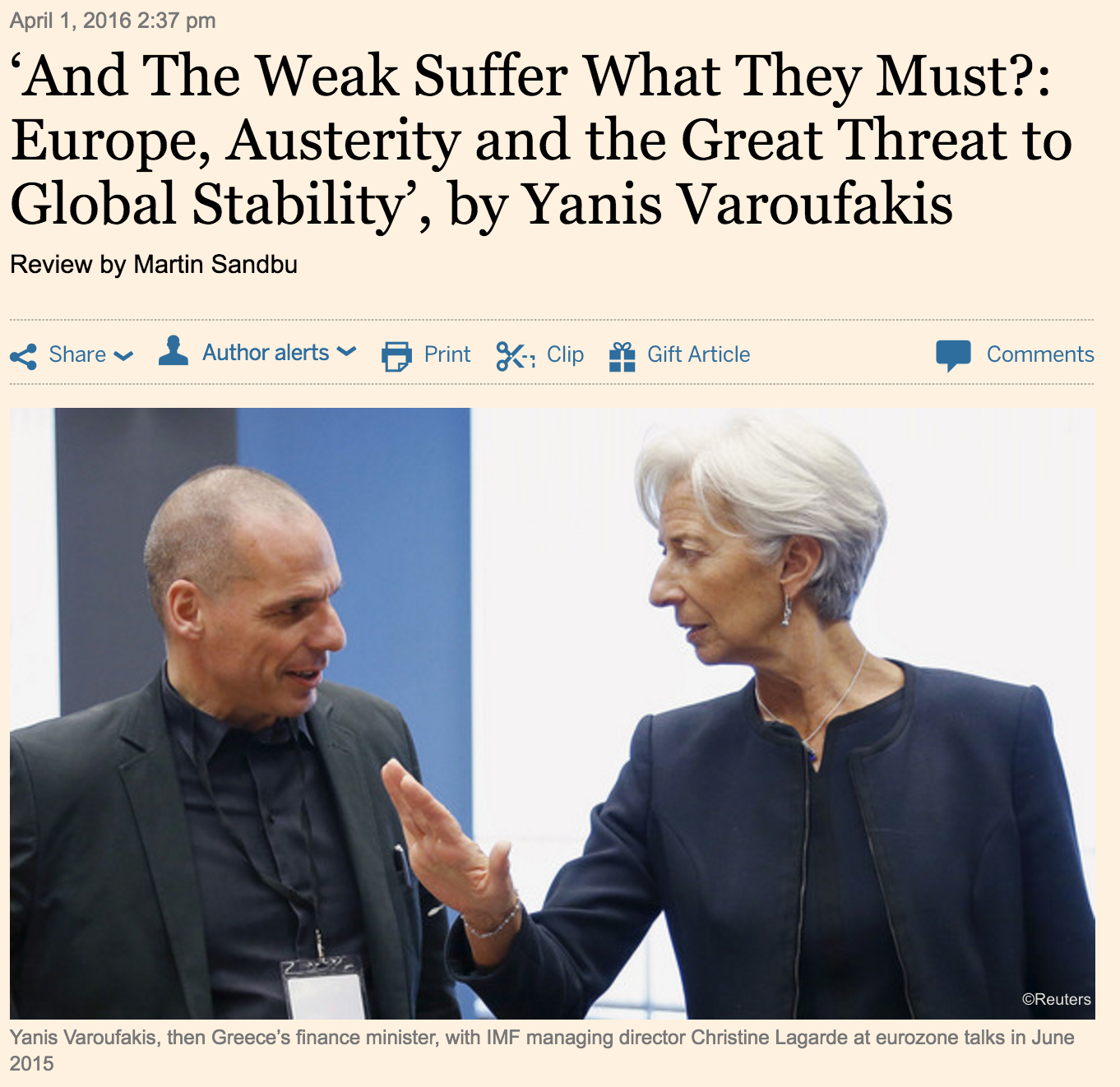 Martin Sandbu reviewed my new book (And The Weak Suffer What They Must?: Europe, Austerity and the Great Threat to Global Stability, Bodley Head & Nation Books) for the FT. (Click here for the, unfortunately, paywalled site.) I wish to thank Martin, whose own book on the same subject (Europe’s Orphan: The Future of the Euro and the Politics of Debt’, Princeton) I enjoyed reading (and partially disagreeing with, just as he does with mine).
Martin Sandbu reviewed my new book (And The Weak Suffer What They Must?: Europe, Austerity and the Great Threat to Global Stability, Bodley Head & Nation Books) for the FT. (Click here for the, unfortunately, paywalled site.) I wish to thank Martin, whose own book on the same subject (Europe’s Orphan: The Future of the Euro and the Politics of Debt’, Princeton) I enjoyed reading (and partially disagreeing with, just as he does with mine).
Not wishing to challenge the review’s overall gist, I hope the reviewer appreciates three points:
Martin says that in the book I attribute: “…Machiavellian genius to some (Germans and Americans) and bottomless ignorance to others (the French and many others). That juxtaposition, so common in conspiracy theories, is apt to raise eyebrows among impartial readers.”
Machiavellianism and ignorance is attributed, throughout my book, on all the main actors fairly and evenly. If there is a bias in my narrative it reveals itself in depicting Italy’s, Greece’s and France’s rulers as more Machiavellian than Germany’s or America’s – not less so. In particular, the reader’s eyebrows are more likely to be raised by my consistent defence of many of the choices of German officials and the castigation of their French counterparts!
Moving on, in the book I argue that the eurozone is in dire straits due to the absence of a political mechanism for recycling surpluses and deficits. Martin objects as follows: “[I]t’s hard to blame the depth of the eurozone crisis on the absence of a political surplus recycling mechanism. Such a mechanism was after all precisely what the eurozone instituted through its various rescue funds. Varoufakis is right to criticise the policies that accompanied them, including excessive fiscal austerity and overly tight monetary policy. But the surplus recycling did happen.”
No it did not! Recycling surpluses means taking surpluses from the surplus regions or countries and turning them into productive investments in the deficit ones. The eurozone did not do any of this type of recycling once the crisis began. No new investment funding was channelled toward the periphery and even the existing structural funding fell due to the inability of national governments to co-fund projects. Martin mistakes the ‘bailout’ transfers for political surplus recycling when they were no such thing. The ‘bailout’, or ‘rescue’, funds were nothing more than cynical transfers of private losses from the northern banks onto the shoulders of Europe’s taxpayers. This has nothing to do with the political surplus recycling mechanism essential for the stability of a currency union.
Finally, Martin agrees with me that “…Greece should have defaulted on its sovereign debt and Ireland should have restructured its banks in 2010.” But then he castigates me for not doing as I preach: “But… [Varoufakis] does not mention why he, as finance minister, did not restructure Greece’s banks early in his tenure, so as to undo their dependence on the European Central Bank, which last summer forced Athens to accept a third bailout by shutting down banking liquidity.”
The reason is simple: Under the legislation that the troika had imposed upon the previous governments, and which was the law of the land when I moved into the finance ministry, I had no authority over the Hellenic Financial Stability Facility which owned the banks and no capacity to amend that legislation without triggering an instant confrontation with the troika. Indeed, that colonial-style legislation demanded the approval of the troika (Mr Wieser’s EuroWorkingGroup) for any intervention in the banks. Put simply, a unilateral decision by myself to restructure the banks, or to legislate without the ‘consent’ of Mr Wieser, would have triggered their immediate shut down by the ECB. This is why their restructuring, which was indeed my top priority, became one of the key issues during my negotiations with the troika.
(The fact that I have to point this out to a seasoned eurozone watcher, like Martin Sandbu, reveals how little Europeans know about the frightful loss of national sovereignty that typifies life in today’s European Union.)
Thanks for the review Martin.














